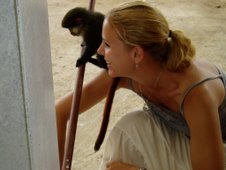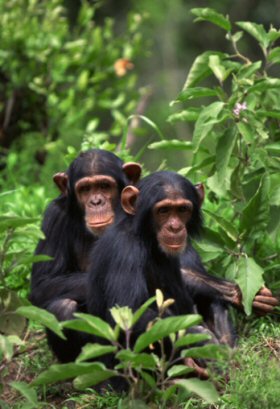On Monday, August 27th, Alex and I slept in a bit before we began the longest day we’ve had since we arrived. Today was moving day, we were finally going to get to move to our site, Busingiro out in the middle of the forest, but first we had some shopping to do. We packed our stuff one last time and then hauled everything to Masindi (in the opposite direction of our site) because we had to buy items we needed for our site, such as pots, pans, sheets, dishes, candles, matches, towels, etc. By the way, Alex and I have negotiated with JGI to let us take the money we spent on items for the field site off of our rent because they will get to keep all these items once we leave. We were very excited that they were so accommodating to this request. At
An hour later, we reach Busingiro and find that our mattresses have been brought inside. There is some water on the floor of our hut, but not much, so we aren’t too displeased…yet. Now the real fun begins, and please understand that I cannot begin to put into words Alex’s and my reaction to our hut as the sun began to set. When we first arrived and were assessing the leakage from the roof, one of the guys that works at the field site was saying something about putting another tarp up on the inside of the roof to secure the hut more from the water, as well as from rat droppings. At this point Alex and I realize we have a rat family living in our roof…we weren’t too excited about this. Then when everyone left and we were unpacking we find a termite nest in the hut, a wasp’s nest and the most gigantic spiders you have ever seen in your life started coming out as it got darker in the hut. Alex and I had made up one of the beds and had decided that we would both try to squeeze into a single bed for the night because neither of us wanted to sleep alone if creatures were going to be crawling all over the very tiny hut all night. We felt better being close to each other. After making up one bed it was too dark to do much else, so we decided to finish unpacking the next day when we could see what we were touching. We headed to go find some food for dinner. During dinner we decided camping was a step up from what we were about to sleep in. Right at that moment, we both looked at each other and said at the same time, let’s find the tent and set that up before it get s much darker and sleep in that for at least tonight. It seemed like a better option than having little scary creatures crawling all over us in the night…a mosquito net doesn’t exactly protect you from huge rats and spiders with ENORMOUS pinchers!! We were a little uncertain of what exactly lives in the forest around camp, but we wanted to take our chances with those animals over what was inhabiting our hut. Though we were a little scared, as the tent Alex brought is a very small 2 person tent, we’re basically sleeping on top of each other, and it’s very flimsy… a big gust of wind would topple the tent in a second. We made it through the first night safe and sound though, and have since found out that there is nothing living in the forest that can harm us, so the tent has become our permanent sleeping quarters for the next 2 to 3 months.
The next day we cleaned out the 2 huts we have (1 for sleeping and 1 for our kitchen) as best we could and finished unpacking. We bought tons of Tupperware because everything has to be covered to keep it safe from the mice, rats and ants. We also covered everything in our “sleeping” hut, including our clothes, which we keep on the bed we made up, under a mosquito net; otherwise you wake up and find insects nesting in them and rat feces covering everything. So it takes some extra time to get into things we need and lots of memory to remember to cover everything again after you use it. And because we have no electricity and it is difficult to move around camp after dark, it takes some pre-planning as well for everything before we do anything. Sometimes Alex and I feel like the day is ours, and the night belongs to the insects, mice and rats.
After we had set everything up, we went to talk to some of the guys that work in camp. These guys are guides, night watchmen, park rangers, and some are teachers/educators, as we are living at one of Jane Goodall Institute’s (JGI) education centers, where school children come to learn about conservation. As we were explaining to the guys what we are researching, they started laughing hysterically that we wanted to try and find the chimps. Apparently the chimps are pretty elusive and very difficult to track. A year ago, JGI stopped the chimp trekking that used to occur at the site because they felt that the ecotourism was actually harming the chimps, but now they are not so sure this is true and so they wanted to attach themselves to Zinta’s project to see if the presence of humans was negatively affecting them. Therefore, since no one has been following the chimps for over a year, all the guides no longer know where to find them. About once a week they hear from the villagers around the site that the chimps are around because they have been crop raiding, but no one knows were their feeding trees are anymore or what there typical path is each day. Alex and I will probably be spending most of our time trying to habituate chimps that for the past year JGI has been trying to unhabituate. The guides have been telling us too, that even if we do find the chimps, they most likely will charge and then run off, so it will be very difficult to follow them once we do find them. And then, yesterday, they told us that if we do find them we will not be able to consistently find them every day. Alex and I are somewhat frustrated with this, but so is the nature of field work. I am definitely up for the challenge, but it does make it difficult to know that once we finally start making some progress she and I will be leaving and new assistants will get the advantage of seeing them more frequently with less effort. Plus if JGI doesn’t really want the chimps permanently habituated, we are trying to habituate them for only a 9 month period and not for long term study most likely, which is also a bit discouraging to know you’re working so hard for an unknown goal. It will be so great though if we can habituate them enough that we can collect the data we need to and to identify all the individuals in the group, as right now, no one knows any of them individually. If we can do this, Alex and I will have accomplished something none of the other assistants on Zinta’s project have done, and something Zinta herself has never done.
We will see how everything turns out… for now I miss everyone! Wish us luck. I will write again soon, with some funny stories, as Alex and I have had lots and lots of laughs since we arrived. Sometimes all you can do is laugh about things that happen here.
Overall, though everyone in this country is so nice and so willing to go out of their way to help us. We have been learning how to make fire, local foods and how to find fruit when it’s not fruit season and we’re not close enough to a major town where fruit is imported. Without the help of some of the guys in camp, Alex and I might not have been eating for the past few days. We were supposed to have a gas tank for out 2 burners to cook with, but the tank has been broken for the last week, and has just been fixed today, but there is no one to bring the tank to us, so we have been sharing the one fire in camp with all the guides and rangers. It’s been too wet to build a second fire. We certainly are learning the local ways and how to survive without much, which has been frustrating at times and even more rewarding at others. I’ve learned how to start a fire by blowing on embers!! I was so excited when I figured this out.
Love you all!!!


No comments:
Post a Comment